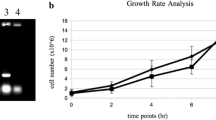Abstract
The haploid cells of the fission yeast, Schizosaccharomyces pombe, are arrested in the G1-phase by nitrogen starvation and are committed to sexual reproduction (mating and sporulation). We isolated the sterile mutants which were defective in G1 arrest following nitrogen starvation. Genetic analysis of these mutants defined a single locus designated as ste16. The nucleotide sequence revealed that ste16 + encodes an 82-kDa protein containing eight WD40-repeats in its carboxy terminal half. The ste16 disruptant was viable, but arrested the cell cycle in the G2-phase after the nutritional down-shift. When transferred to fresh growth medium, the G2-arrested ste16Δ haploids resumed the mitotic cycle from the S-phase, resulting in diploidization. This diploidization phenomenon was completely suppressed by the null mutation of rum1 encoding the inhibitor of Cdc2 kinase. As the Rum1 protein level was remarkably elevated in the ste16Δ, the Ste16 protein negatively controls the Rum1 level. The loss of function of ste16 disturbs the cell-cycle progression and impairs the mechanism for the maintenance of ploidy.
Similar content being viewed by others
Author information
Authors and Affiliations
Additional information
Received: 10 September / 6 October 1997
Rights and permissions
About this article
Cite this article
Maekawa, H., Kitamura, K. & Shimoda, C. The Ste16 WD-repeat protein regulates cell-cycle progression under starvation through the Rum1 protein in Schizosaccharomyces pombe. Curr Genet 33, 29–37 (1998). https://doi.org/10.1007/s002940050305
Issue Date:
DOI: https://doi.org/10.1007/s002940050305




